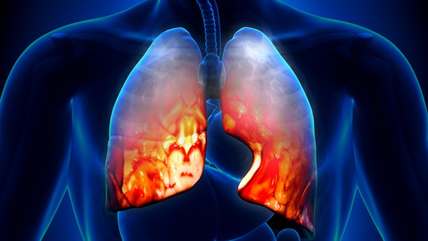Acidity and Heartburn Medications May Up Risk Of Pneumonia In The Elderly
Acidity and Heartburn Medications May Up Risk Of Pneumonia In The Elderly: Study The findings of the study revealed that there was a higher rate of pneumonia in older people who received PPIs over a two year period.

Older citizens who frequently observe instances of heartburn or stomach ulcers and are on widely prescribed drugs to neutralize the same could be at a higher risk of pneumonia, claims a new study. According to the researchers, approximately 40 percent of older adults receive proton pump inhibitors (PPIs), although according to some experts, up to 85 percent of people who receive PPI prescriptions may not need them.
The findings of the study revealed that there was a higher rate of pneumonia in older people who received PPIs over a two year period. For the longest time PPIs were considered to be harmless, it is only in the recent times that PPIs have more been linked to increased rates for certain health concerns like fractures, cardiovascular disease, and some bacterial infections.
"Our study adds to growing evidence that PPIs are not quite as safe as previously thought, although they are still a very useful class of medication for certain groups of patients," said David Melzer, Professor at Britain's University of Exeter.
However, "caution is needed in interpreting the findings," Melzer added, in the paper published in the Journal of the American Geriatrics Society.
For the study, the team selected 75,000 patients 60-years-old and older who had taken prescribed PPIs regularly and who also had previous regular medical records.
The researchers clarified that this is not a cue to abandon PPI medication completely. Researchers said that they should discuss with their prescribing healthcare professional whether the PPIs are still needed.
Researchers said that stopping PPIs abruptly could be dangerous as PPIs may be useful, for example, to prevent stomach bleeds in some people.
It is advised to regularly review your use of medicines like PPIs with your healthcare providers to make sure each prescription is still needed.
Some common foods may stimulate increased stomach acid such as foods that are acidic in nature like meat, dairy products and some citrus fruits, foods that have a high sugar content and even common foods like onions and garlic. But there are a host of natural ways to regulate acid reflux too. Here are seven quick things you can do to prevent heartburn.
1. Add probiotic to your diet: Macrobiotic Nutritionist Shilpa Arora, who was not part of the study suggests that you must add some form of probiotics to your diet like a bowl of yogurt or a glass of buttermilk. These contain lice enzymes that support your gut bacteria and keep you digestive system healthy. In fact, you should even replace cream used in some dishes with yogurt.
2. Check for the pH level of the food: In order to keep acidity and heartburn at bay, the pH level of the foods you consume regularly should be kept in mind. A pH below 7 implies that the particular food item is highly acidic.
3. Chew your food properly: Eating foods that require more chewing produce more saliva. Your saliva helps in neutralizing the acid that comes up from the stomach.
4. Drink ginger and Tulsi juice before your meals: “Drinking this concoction ensures proper absorption of food. Ginger is known to absorb excess stomach acid and thus, helps in digestion. It speeds up the process by pushing the food through bowels and so prevents the formation of gas in the stomach,” says Shilpa.
https://www.ndtv.com/food/acidity-and-heartburn-medications-may-up-risk-of-pneumonia-in-the-elderly-study-1843015
